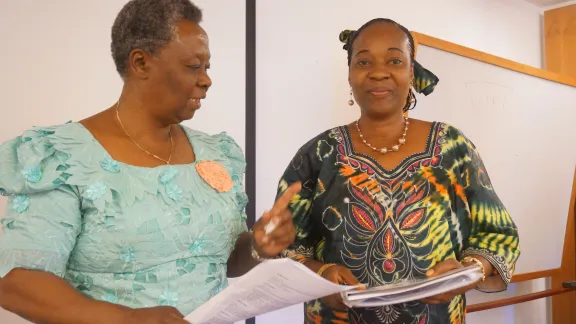
Dr Helen Kijo-Bisimba, of Tanzania (left), and Rev. Solange Yumba wa Nkulu, DRC, at the womenâs rights advocacy training in Geneva. Photo: LWF/P. Mumia
LWF and partners workshop facilitates access to UN mechanisms
GENEVA, 11 July 2015 (LWI) – Training workshops organized by The Lutheran World Federation (LWF) have strengthened Rev. Solange Yumba wa Nkulu’s role as national coordinator for women, youth and family work for the Evangelical Lutheran Church in Congo. “But this one has made all the difference in the way I perceive my work for women’s rights,” she says of her participation in the faith-based organizations training on Women's Human Rights Advocacy in Geneva this week.
The Congolese pastor is among 25 women and men from 18 countries participating in the 7-11 July workshop organized by the LWF jointly with the World Council of Churches (WCC), World Young Women’s Christian Association, ACT Alliance and Finn Church Aid. The training is aimed at increasing participants’ effectiveness in the use of United Nations mechanisms such as reporting to the Committee for the Convention on the Elimination of All Forms of Discrimination Against Women (CEDAW) or the Universal Periodic Review (UPR) of individual countries’ human rights situations.
“This training has given me a comprehensive understanding of how my DRC context can specifically contribute to sharpening LWF’s global advocacy. Women have suffered all sorts of violations, including rape and other forms of gender-based violence because of the protracted civil conflict. Learning how the UN Human Rights mechanism works, knowing the tools that I can use locally to mobilize, engage and influence important global decisions for women’s empowerment was particularly important,” Yumba wa Nkulu emphasized.
Training facilitators from the Office of the High Commissioner for Human Rights and the LWF Office for International Affairs and Human Rights presented the working mechanisms of CEDAW and the periodic review respectively. Other LWF and partner organizations’ staff elaborated the role of religion in human rights advocacy; how to integrate gender analysis and rights-based approach in advocacy for women’s human rights; and opportunities and challenges for collaboration between faith-based organizations and other UN agencies. Participants also held discussions with CEDAW Committee experts and joined the committee’s review session for Spain.
The LWF Women in Church and Society (WICAS) program at the Department for Theology and Public Witness coordinated the training. One of the workshop’s reference documents was the LWF Gender Justice Policy, approved by the LWF in 2013, and currently being adapted by member churches for their respective contexts.
Local collaboration with civil society
The workshop included sessions on local advocacy by civil society and faith-based organizations. Ms Beatriz Garciá del Campo from the LWF World Service program in Colombia, discussed the value of forging partnerships with churches, other FBOs and civil society organizations in defending human rights’ workers and women in complex conflict situations.
In her presentation, Dr Helen Kijo-Bisimba, executive director of Tanzania’s Legal and Human Rights Centre, explained her organization’s involvement in reviewing the country’s human rights situation since 2012. The center has increased its engagement with civil society organizations in order to influence government compliance in implementing the periodic review recommendations. “We are making progress, but churches and other faith bodies need to come on board in a country with over 3,000 NGOs,” added Kijo-Bisimba, a member of the Evangelical Lutheran Church in Tanzania.
Keeping up the momentum
The workshop concludes today, with participants setting priorities for their respective regions and strategizing how to keep the momentum of linking grassroots’ initiatives to global advocacy. “Until now, I did not fully understand how I can influence change to promote women’s welfare at the national level,” remarked Rev. Kenneth Sibanda, gender justice program coordinator for the Evangelical Lutheran Church in Zimbabwe Central Diocese.
“Learning about CEDAW, the Universal Periodic Review, LWF’s advocacy work and other approaches encourages and empowers my engagement in the church and with the government on violence against women including domestic violence,” Sibanda noted.
For LWF training co-organizer Maria Cristina Rendón, the workshop has provided a unique and meaningful platform to share experiences and move forward together with a common perspective. “As members of civil society, faith-based organizations are part of the critical grassroots that holds governments accountable at national level for the implementation of CEDAW and UPR recommendations as well as the UN Security Council resolution on women, peace and security,” added Rendón, WICAS program assistant.
See report by LWF partner, the World Council of Churches


